Innovation Day and “Inno d’Or – Innovation of the Year 2024” report
Innovation Day for the fourth time this year
Once again, the innovation competition initiated by Trade magazine in 2021 was held, which this year was again accompanied by a full-day professional conference. The Innovation Day event and within it the Inno d’Or – Innovation of the Year 2024 award ceremony took place at Hungexpo on May 16th.
The event featured exciting professional presentations and discussions that showcased current innovations and novelties, followed by the awarding of the Inno d’Or – Innovation of the Year 2024 awards and special prizes.
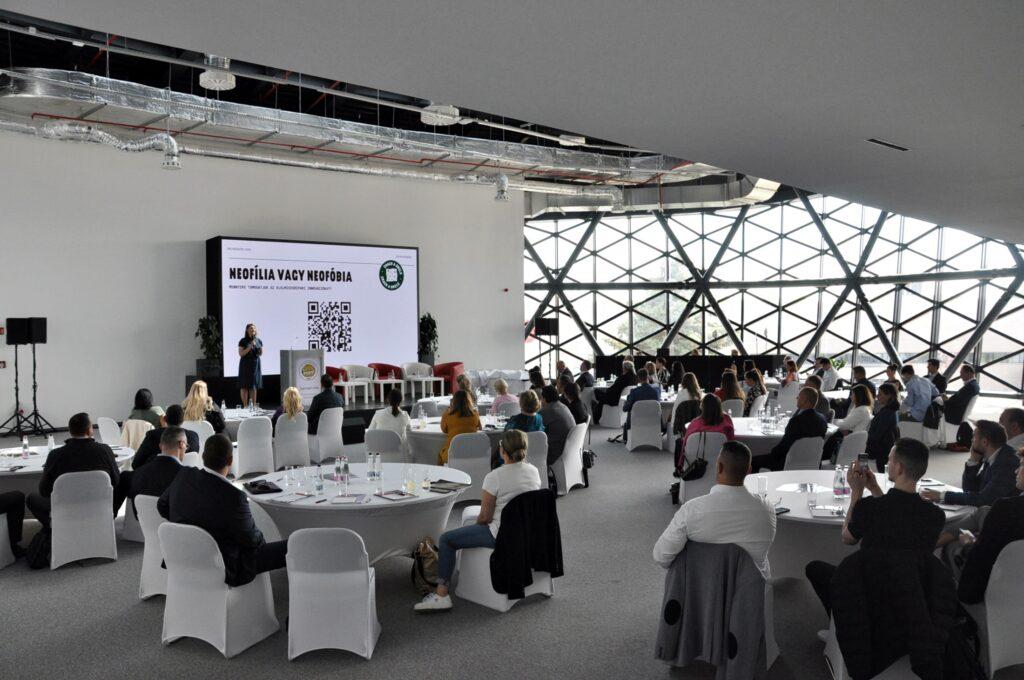
 Zsuzsanna Hermann, Managing Editor of Trade magazine
Zsuzsanna Hermann, Managing Editor of Trade magazine
The event was opened by Zsuzsanna Hermann, Managing Editor of Trade magazine, who briefly summarized the current innovation landscape in the FMCG market, which was also reflected in this year’s competition. Unfortunately, the economic environment, uncertain market situation, and consumers’ tight budgets do not favor innovations. Fewer are willing to bear the costs of innovations, and consumers are also less likely to spend on trying out new products. However, the driving force of innovations always supports recovery, so efforts in this direction should never be abandoned. The participants in this year’s competition can certainly be proud of the novelties presented, as many products have set directions and examples for market players.
International innovation trends
 Júlia Dalmadi, founder of Trans Food Mission and Secontaste
Júlia Dalmadi, founder of Trans Food Mission and Secontaste
Firstly, Júlia Dalmadi, founder of TransFoodMission and Secontaste, presented how the food industry can respond to sustainability challenges. In her presentation, she highlighted three key areas – runaway raw material prices, resource utilization, food waste – and provided concrete examples to illustrate the situation.
Among the innovations in the increasingly expensive cocoa industry, an American company featured that uses molecular-level flavor profiling from alternative ingredients to create the chocolate experience. Additionally, a cell-based agricultural technology that rethinks chocolate production was introduced, while a British initiative uses St. John’s bread and barley to produce a cocoa-free, chocolate-flavored product. Regarding the sustainable use of resources, Júlia Dalmadi mentioned the cooperation between Starbucks and the Canadian Dairy Association, which supports dairy farmers transitioning to environmentally friendly farming practices.
She emphasized that upcycling as an innovative form not only has environmental benefits but also generates economic profit: it creates value from wasted raw materials. She also mentioned her own company, which uses by-products from beer production to make breakfast cereals and beer snacks.
An innovative beverage was discussed, based on caffeine but containing no coffee or tea: the caffeine is extracted from by-products that are secondary outputs for other companies. The process starts with flavor mapping, which helps determine which by-products are suitable for creating the desired flavor profile.
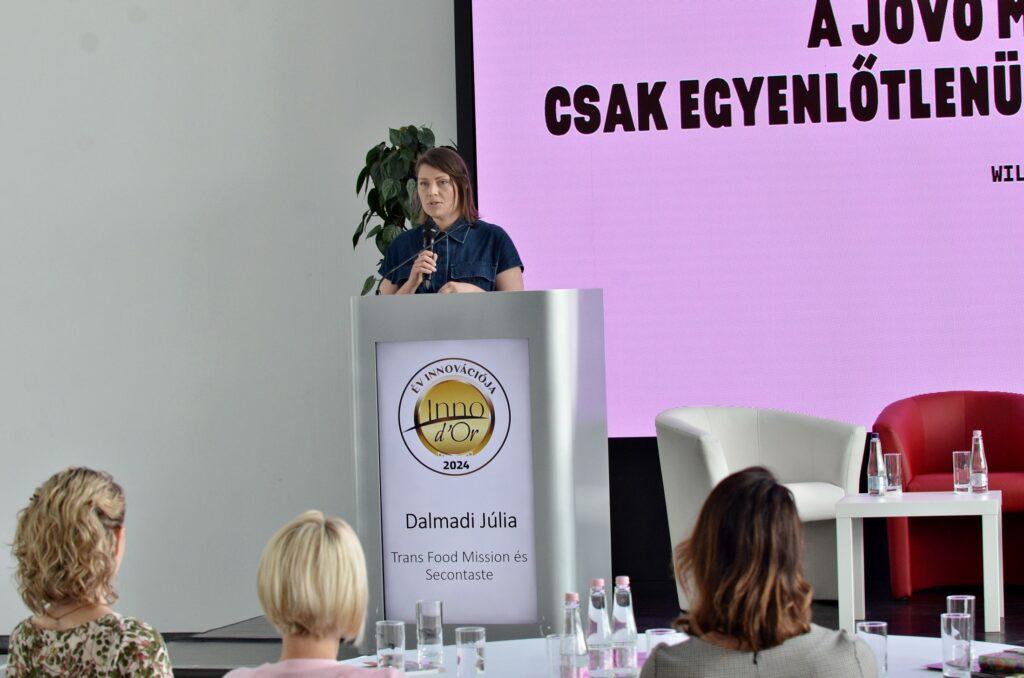
Innovation trend = alternative
One of the highlighted programs of Innovation Day was the roundtable discussion, moderated by Dr. Beáta Olga Felkai, Deputy State Secretary of the Ministry of Agriculture. The panelists included: Tamás Éder, President of the Hungarian Meat Association, Zoltán Harcz, Managing Director of the Dairy Product Council, Dr. Beáta Kápolna, Director of Procurement at METRO Wholesale, István Miskolczi, Executive Director of the National Association of Plant-Based Food Manufacturers and Distributors, and Attila Vörös, Executive Director of the Responsible Food Producers Association.
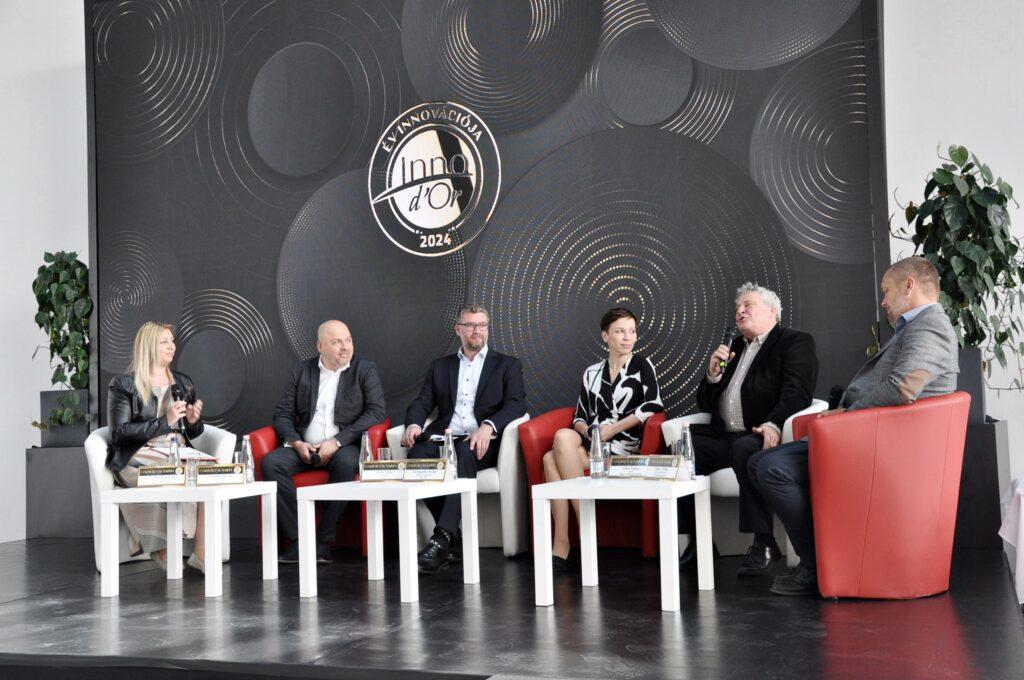
 Tamás Éder, President of the Hungarian Meat Association
Tamás Éder, President of the Hungarian Meat Association
Tamás Éder noted that although significant research-based innovations took place in the country in the meat industry in the early 80s and 90s, today Hungary has a follower position due to resource scarcity: we adopt functioning solutions a few years after they are applied by Western European countries.
Less than 1 percent of global meat consumption consists of alternative products, which, according to some forecasts, might reach 6-7 percent in ten years, but this is still uncertain. The experience of recent years is that high inflation has stalled the consumption of alternative products. Europe’s meat industry is divided: the Italian, Spanish, and French market shares have a conservative stance. A market protection battle is underway, ensuring that meat products are meat products, everything else falls under “other” category. Meanwhile, Scandinavian, German, and other Western European meat market players have accepted alternative solutions, and major companies are developing and manufacturing in both directions. In Hungary, several companies produce both meat products and alternatives, but there really isn’t enough demand for plant-based meat substitutes to bring appropriate profit, so there is no widespread production yet. The number of flexitarians is currently a fraction of the European average—if we catch up over time, manufacturers will likely join in too.
 Zoltán Harcz, Managing Director of the Dairy Product Council
Zoltán Harcz, Managing Director of the Dairy Product Council
Zoltán Harcz believes the dairy industry is perhaps the most innovative sector, as an average supermarket carries hundreds of different dairy and dairy products, although unfortunately, a large proportion of these are not domestically produced. He is proud that Hungarian dairy processors universally produce lactose-free products, yet the import ratio for desserts, butter, cheese, and yogurt is extremely high.
In Hungary—in comparison with the EU—we drink a lot of milk, especially since consumer liquid milk has been included in the government price list. The market share of plant-based drinks, by contrast, is only a few percent, but it is notable that its growth has been impressive—up 157 percent according to some statistics, albeit from a very low base.
Zoltán Harcz believes that education should be emphasized so that consumers are aware of the origin, distinguishability, content, and physiological benefits of the products.
 István Miskolczi, Executive Director of NÉGYOSZ
István Miskolczi, Executive Director of NÉGYOSZ
István Miskolczi believes that the many debates about what to call things are unnecessary, since the consumer in this segment knows exactly what they are taking off the shelf, and the term “almond milk” does not mislead them. There is no need for more regulations, but rather the focus should be on eliminating truly misleading practices by the authorities. The goal should be to have as many Hungarian manufacturers in the segment as possible instead of foreign dominance. The train for milk substitute products has already left the station for Hungarian manufacturers; the competition is huge, making it very costly to enter. However, there are other opportunities in other product categories worth paying attention to and developing, as there are opportunities.
He also believes it’s important to be open because regardless of whether the consumer turns to plant-based products for animal welfare, sustainability, or health reasons, we must serve them. The hospitality industry is perhaps the best example of this, as guests go where every family member can find something they like, regardless of their diet.
 Attila Vörös, Executive Director of FÉSZ
Attila Vörös, Executive Director of FÉSZ
Attila Vörös, pointed out that Hungary’s food processing industry accounts for barely 1 percent of the EU’s. The Hungarian market is slowed down by a strict regulatory environment, extra taxes—public health product tax, retail taxes—and administrative burdens—reporting and payment obligations related to packaging, our self-inspection system, EPR—leaving little resources for innovation.
He compares the competition in the EU’s food industry to a 100-meter flat race where the starting gun goes off, and the Polish, German, Czech, Austrian, or Romanian food industries start a 100-meter flat race, while Hungarian manufacturers start a 110-meter hurdle race.
The environment we work in is much less supportive of innovation than other competitor countries – he said. – The environment is constantly changing, the extent of which can be debated, but the development, the change itself is pointless. Inside FÉSZ, all directions and profiles are found, so we must support these innovative endeavors as much as we can.
In terms of technology, the Hungarian competitor starts with a significant disadvantage: if we look at how much CO2 emission is generated for one euro of added value produced in the EU and Hungary, then we have a factor of two compared to the EU average, meaning we are half as efficient in energy. The situation is similar in terms of labor efficiency.
So we need to modernize to catch up with the flat runners, but we also need to jump over the hurdles along the way – he returned to the sports analogy.
 Dr. Beáta Kápolna, Director of Procurement at METRO Wholesale
Dr. Beáta Kápolna, Director of Procurement at METRO Wholesale
Dr. Beáta Kápolna elaborated that sustainability and modern technologies are increasingly playing a major role in METRO’s supplier strategy, which is evident in the continuously expanding product range in these categories.
She highlighted that smaller, innovative companies in the food industry can gain a significant advantage by being able to respond more quickly to market demands and adapt to new technological trends. Of course, it must be accepted that if the consumer is in a difficult situation, they will primarily look at prices, but she is optimistic about the future.
It is important to adapt to the trends, and unfortunately, if there is no Hungarian product available that the buyer is looking for, they will buy the import, and the retailer will keep it on the shelf, as their primary goal is to respond to customer demand. The domestic supplier market needs to be open to the needs for new innovative products.
 Dr. Beáta Olga Felkai, Deputy State Secretary of the Ministry of Agriculture
Dr. Beáta Olga Felkai, Deputy State Secretary of the Ministry of Agriculture
The discussion moderator, Dr. Beáta Olga Felkai, summarized that today, the motivation for plant-based innovations can be manifold: some consumers turn to these products for health reasons, others out of curiosity, as there is also a fashion trend, and many for sustainability reasons. There used to be less milk, yet there were already plant-based products in the 1800s.
In the field of meat substitutes, we can talk about a growth of about 20 percent, and today we can hardly enter a place without being asked whether we want our coffee with cow’s milk or a plant-based drink.
At home, we experiment less, but when we go out, we are more open. The hospitality industry therefore has a serious responsibility to bring alternatives closer to people. Many do not consider sustainability, but if a child tries pea protein-based bolognese in a restaurant and likes it, they will ask for it at home next time.
EU regulations state that milk can only be called the secretion from the udder, with a few exceptions, such as coconut milk or pork cheese…, however, the regulation is also important from an educational perspective: if we tell the consumer to grate the vegan block on the pasta, they may not know what that means. Proper naming and education help the buyer know what they want to buy and what they are being offered.
We need to realistically see the burdens of the sector, and development and research are needed, not just in these sectors, but in the entire food industry – the deputy state secretary concluded.
What does an investor need?
 Levente Balogh, President of Szentkirályi Hungary, CEO of Vitapress, entrepreneur, investor, shark
Levente Balogh, President of Szentkirályi Hungary, CEO of Vitapress, entrepreneur, investor, shark
Levente Balogh, President of Szentkirályi Hungary, a well-known investor in the show “Shark Tank,” spoke about how the traditional fight for capital is no longer enough, and education and mentorship are even more important. He is currently a partner in an AI-focused startup that develops AI solutions for webshops. He believes AI is key to enhancing business efficiency and addressing the labor shortage issue.
Levente Balogh believes that brand building is the basis of business success: no matter how much quantity is available from commercial private labels, serious profits are hidden in well-established manufacturer brands. Moreover, the security of the manufacturer is questionable, since if the company producing the private label product makes a mistake, the next week another company will produce the same thing. In contrast, “Gucci, Louis Vuitton, are companies that have survived wars for a hundred, two hundred years” – a brand is never replaceable.
He identified three pillars of a brand’s success: product technology, i.e., a product made with the right technology, appropriate marketing, and professional sales. A well-established, tradition-creating brand signals quality, which provides crisis-resistant consumer trust and increases the overall market value of the enterprise – that’s why it will always be in the market.
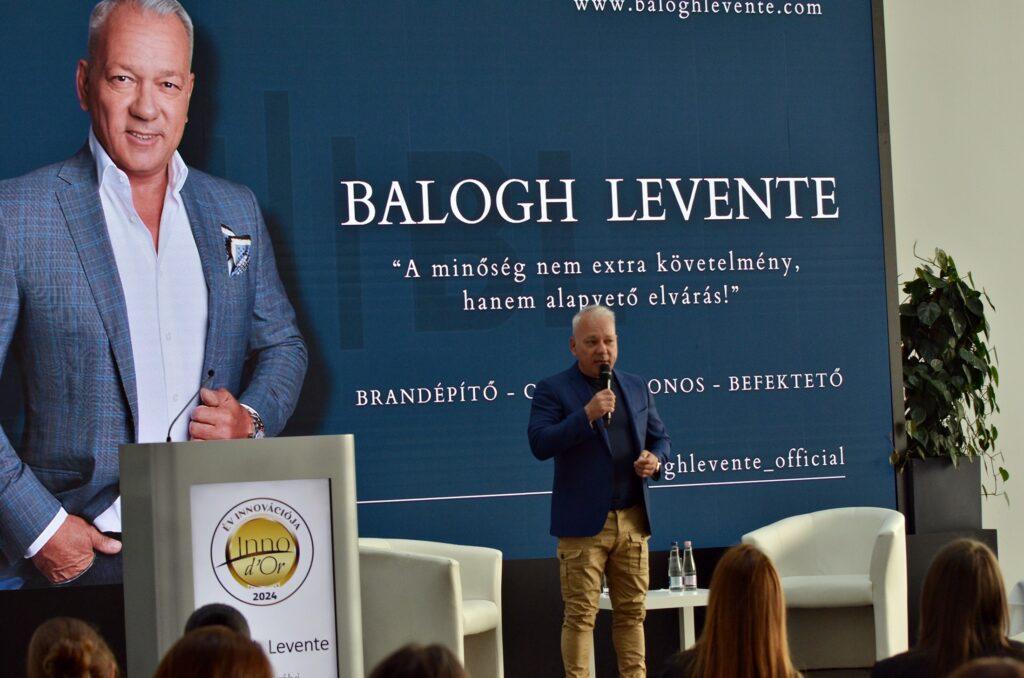
Is AI always necessary?
 Dr. György Tilesch, international AI expert, founding president of the PHI Institute
Dr. György Tilesch, international AI expert, founding president of the PHI Institute
Dr. György Tilesch, founding president of the PHI Institute for Augmented Intelligence and an AI expert, spoke with Zsuzsanna Hermann.
A significant part of Asia is highly AI-accepting, with about 80-85% support among the population. Society accepts it, and politicians and large corporations see AI as key to global power aspirations.
In contrast, America has somewhat slept on AI vision and regulation. Now, it faces the reality that, although most major technology (and AI) companies are American, little emphasis was placed on developing a coherent societal vision for AI. Policymakers believed that as long as American corporate dominance was not challenged, intervention was unnecessary.
Europe shows a different scenario. Due to its significant lag in exploiting technological potential compared to the United States and China, it primarily approaches artificial intelligence through regulation. However, this will make the EU AI Act the world’s first framework regulation, coming into effect within weeks.
Tilesch György points out that Amazon achieved its market dominance, which we see today, 80 percent through the use of AI technologies, especially in automated warehousing solutions and personalized customer experiences.
AI technologies are increasingly capable of solving complex problems, such as predicting consumer behavior or optimizing inventory management. This is particularly significant for FMCG companies, where AI enables more efficient supply chain management, productivity enhancement, and cost reduction.
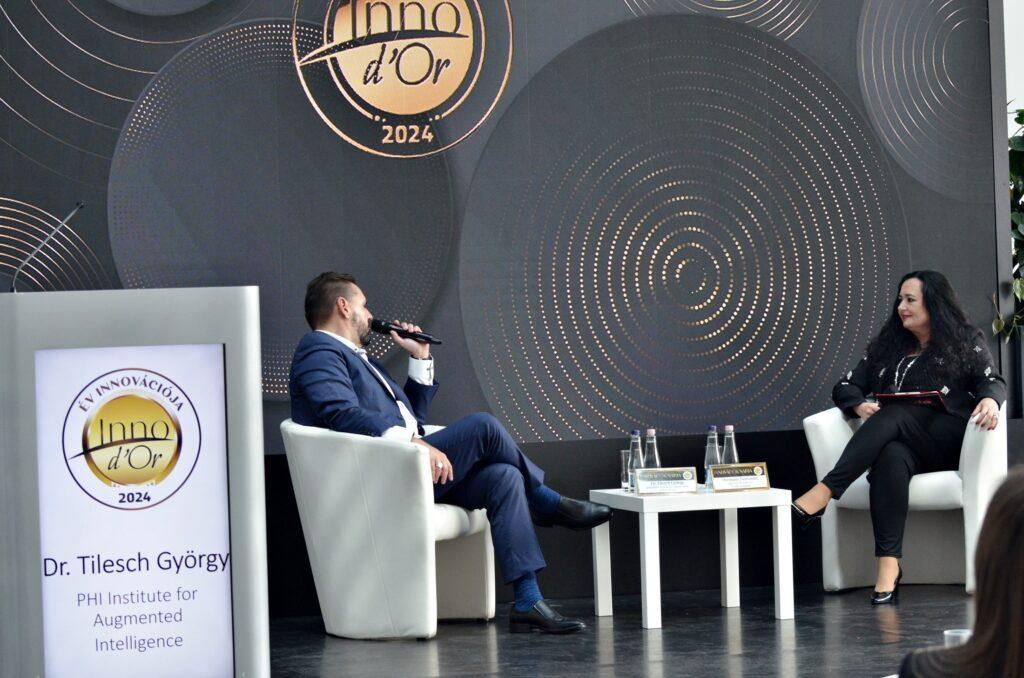
Retail innovations and consumer needs
 Krisztina Bakonyi-Kovács, Senior Consultant at CPS GfK-YouGov
Krisztina Bakonyi-Kovács, Senior Consultant at CPS GfK-YouGov
Krisztina Bakonyi-Kovács, Senior Consultant at CPS GfK-YouGov, states that consumers have learned something from each of the crises they have experienced in recent years. Before the Covid pandemic, innovation and sustainability came to the fore in 2018-19. During the Covid period in 2020-21, lockdowns increased the proportion of home meals, and more was purchased from food and household chemical products; we learned to stockpile. From 2022, as a precursor to the cost-of-living crisis, price and pragmatism came to the forefront. We learned to shop frugally, removing product categories from the basket that were not absolutely necessary. We assessed where it was worthwhile to shop to get the most for our money.
A large part of consumers is trying to spend even less on daily consumer goods, buying only what is most necessary, preferably private label due to the lower price. The importance of thriftiness has increased in food purchases: the role of price and shelf life has grown, while many other aspects, such as nutritional value, quality, Hungarian origin, have lost significance. Despite the symptoms of crisis, or perhaps because of them, it is worth for brands and retailers to invest in innovation. Numerous studies have been conducted to evaluate the data from previous crises, and aggregated data from CPS GfK across Europe also confirm that investments in product development and new product introductions typically pay off in market share and profit during the next expansion period. Regaining consumer trust is important not just for brands but also for retailers affected by consumer crisis reactions, i.e., the tendency to keep the basket size low, hunt for promotions, and expand the range of visited stores (in the hope of better offers). Innovation is an effective tool in retail to regain the trust of consumers who have drifted away for financial reasons. Retaining customers contributes to the complex shopping experience (so not just price matters), and this is particularly true for younger generations. Smart devices aid in creating personalized offers, promotions (e.g., with AI), in-store automation (e.g., self-scan), product displays (e.g., apps, AR), and cashier-less shopping (walk-out technology).
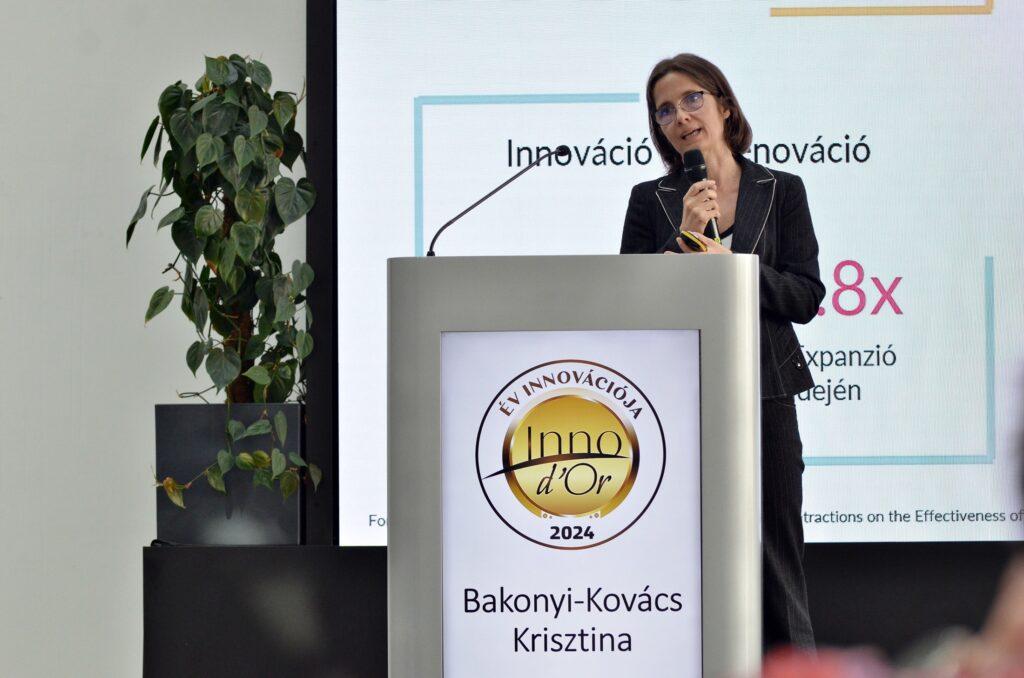
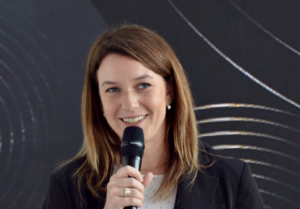 Krisztina Rátonyi, the event moderator
Krisztina Rátonyi, the event moderator
The award ceremony and the Innovation Day event were moderated by Krisztina Rátonyi.
Domestic recognition, international round
The goal of the Inno d’Or – Innovation of the Year competition is to annually reward value-creating innovations that meet a defined consumer need, fit into an identifiable trend, or are the result of a development inspired by an existing, definable need. The best of the competition, based on the Jury’s decision, may receive the Best of the Best, Best Innovation, and Pioneer of the Year, Category-Creating Innovation recognitions.
The competition is a huge recognition and an opportunity for the winning applicants, as per the agreement between Trade magazine and ESM, it serves as an entry to the BIG (Brand Innovation in Grocery) Awards for the domestic competition. Consequently, the winners can apply for the international competition with a 40% discount. The BIG Award is open to any branded food and non-food product currently available in retail in at least one European country. Applicants are expected to represent high quality, carry distinctive distinguishing features, and stand out among the best products in their category. (More information: big-awards.com)
5 categories, 26 winners
This year’s competition saw 26 submissions emerge as winners based on the high number of professional jury evaluations, which were market introductions between January 1, 2023, and December 31, 2023, and were defining novelties in their own categories.
The evaluation of the innovations presented in the submissions was based on five criteria: innovation content, trendiness, market advantages, periodic results, and market opportunities, conducted by the professional jury, and then, where possible, sensory evaluation was also performed.
Submissions arrived in the specified main categories, including both manufacturer and commercial brands, with entries from both B2B and B2C. For the first time, the “free-from” submissions could also compete in a separate category.
The top 3 submissions that received the most points were announced as absolute winners. Due to a tie, this year five submissions received a special certificate with the Best of the Best 2024, i.e., the “Best Innovation 2024” recognition. Furthermore, one applicant received the Pioneer of the Year 2024, i.e., “Category-Creating Innovation 2024” recognition certificate.
The awards were presented by Dr. Beáta Olga Felkai, Deputy State Secretary, and Zsuzsanna Hermann, jury chair. The winning submissions were entitled to use the “Inno d’Or – Innovation of the Year 2024” title.
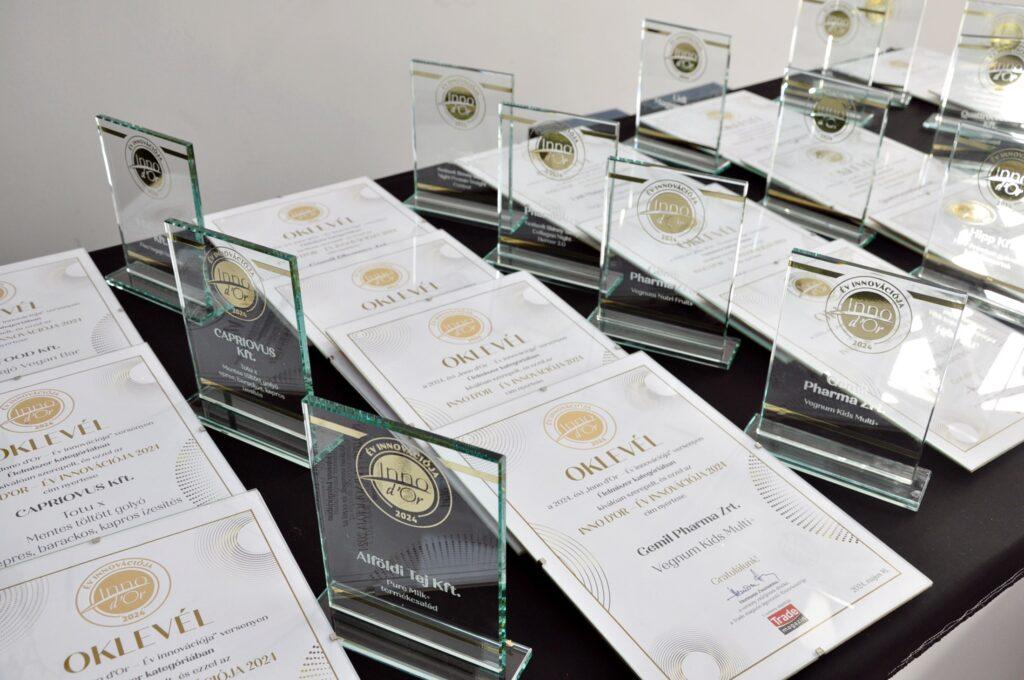
Inno d’Or – Innovation of the Year 2024 Awards
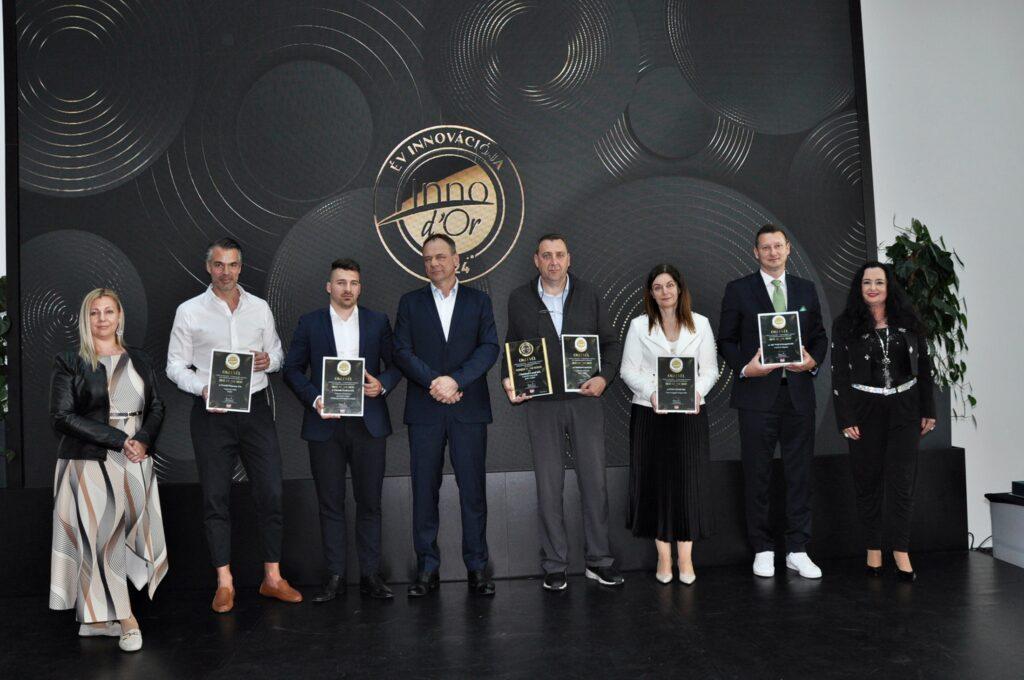
Best of the Best – Best Innovations 2024 and Pioneer of the Future 2024 – Category-Creating Innovation 2024 happy owners
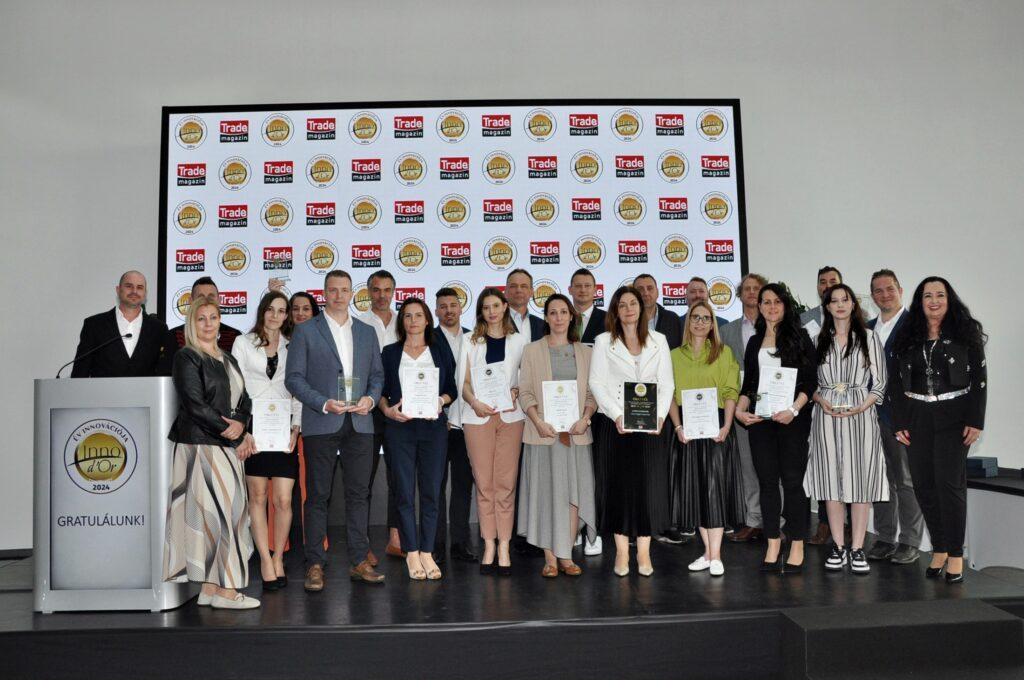
This year’s winners and the award presenters.
Congratulations to the winners on behalf of the professional Jury and the Award Presenters congratulations!
Inno d’Or – Innovation of the Year 2024 Award Winners
Congratulations from the professional Jury and the Award Presenters!

